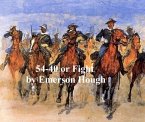For much of the nineteenth century, the boundaries of the United States were in flux. Frontier lawyer turned Western writer Emerson Hough takes on the topic of one such border controversy in the novel 54-40 or Fight, an action-packed account of the campaign to wrest control of the Pacific Northwest from the British.
Dieser Download kann aus rechtlichen Gründen nur mit Rechnungsadresse in A, B, BG, CY, CZ, D, DK, EW, E, FIN, F, GR, HR, H, IRL, I, LT, L, LR, M, NL, PL, P, R, S, SLO, SK ausgeliefert werden.



